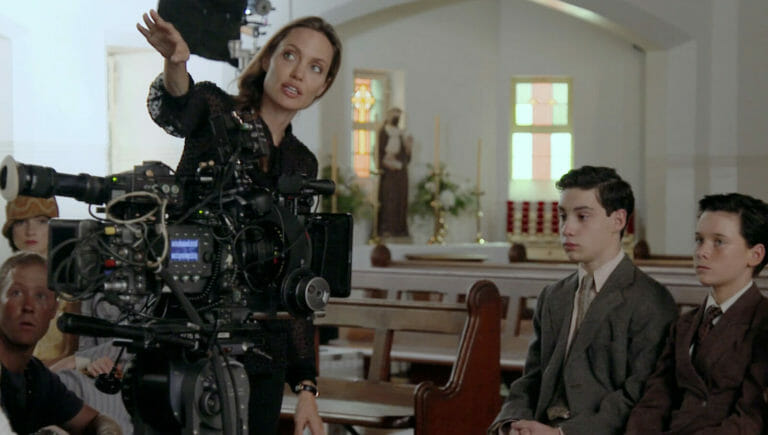By Staff · November 14, 2017

By: Tom Dever
In a packed Egyptian Theatre with more than six hundred in attendance, Angelina Jolie spoke gracefully about her fourth feature film, First They Killed My Father. Based on the non-fiction book by Loung Ung (joining Jolie on the Q&A), the Netflix-distributed film tells the story of Ung’s own experiences under the Khmer Rouge regime in 1970s Cambodia.
Jolie, undoubtedly one of the world’s most well-known actresses and filmmakers, discussed her experience making the film and offered the eager AFI Fest crowd a few lessons for their own projects.
Jolie initially developed an interest in Loung’s book after she purchased it on a street corner while filming Lara Croft: Tomb Raider— seventeen years ago. They refused to shoot the film anywhere but Cambodia, a country without a substantial film industry or infrastructure. For nearly two decades, Jolie and Loung coordinated on separate charities and activist projects, developing the script and waiting for it to all come together. After partnering with Netflix, they moved into production in November of 2015.
For writers, it is natural to want everything to happen quickly and efficiently. Sometimes, doing a project correctly can take years longer than you’d hoped, but it’s always worth it when it comes together in the end.
 #2. HUMILITY
#2. HUMILITYFirst They Killed My Father was produced by critically-acclaimed Cambodian film director and screenwriter, Panh Rithy. His works focused heavily on the genocidal Khmer Rouge regime, making him a natural fit for the project. Jolie spoke of the experience of directing a film about a nation and culture that was not her own. From the very beginning, she deferred to Rithy and trusted his judgment for the treatment of such sensitive material.
Though you would never know it from her calm demeanor, Jolie is undoubtedly preceded by her fame and influence. On a project like this, it would be very easy for a director of her stature to force a production to yield to her demands. Instead, she respected the expertise of her collaborators and knew when to take someone else’s guidance.
Writers, perhaps more than any other creative, are protective of their work. Someone else offering a criticism, even a constructive one, can feel like a personal insult. It is important to remember, though, film is a collaborative medium. By surrounding yourself with smart people who care about you and your project, making changes or concessions, even ones you were initially resistant to, can help your project reach its full potential.
 #3. WRITE WHAT YOU LOVE
#3. WRITE WHAT YOU LOVEAs mentioned, Jolie first read the book while shooting Lara Croft in Cambodia. It fostered a connection with the nation, its people and its history. Her son, Maddox, was born in Cambodia in August of 2001. Jolie also spoke of his connection to the country, the story and the film. He served as an executive producer as well.
For an actress like Jolie at this point in her career, she could easily take parts in blockbusters or franchises and never worry about work again. Instead, she took on a project that meant something to her. In the culture of tentpoles and super heroes, a film about genocide in southeast Asia doesn’t fit with our modern conception of “broad appeal.” Jolie and Loung, though, remained dedicated to the project and saw it through to completion.
As writers, it is easy to feel the pressure to write something more “commercially appealing” or get the sense that no one likes the types of projects you write. The fact is, no writer, even the best, can fake their passion for the story. If you deeply care about what you are writing, whether it is a historical drama or a big budget blockbuster, it will come across on the page, in the film and with the audience.
For the latest from The Script Lab, check us out on Twitter, Facebook, and Instagram.